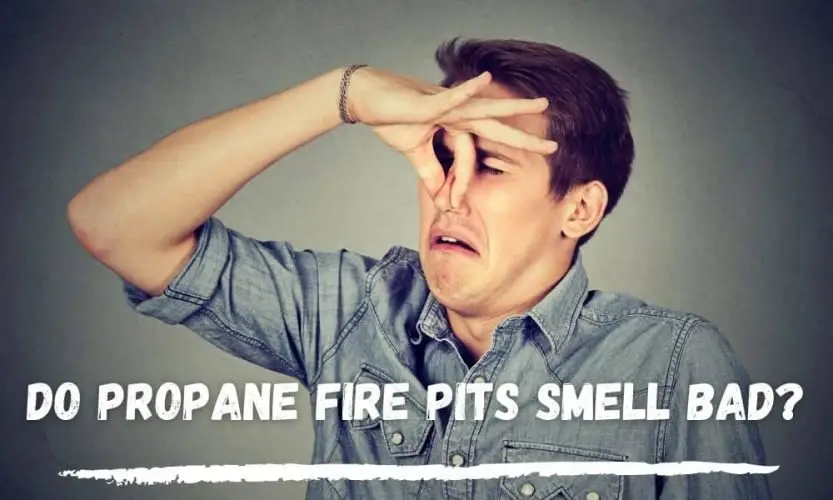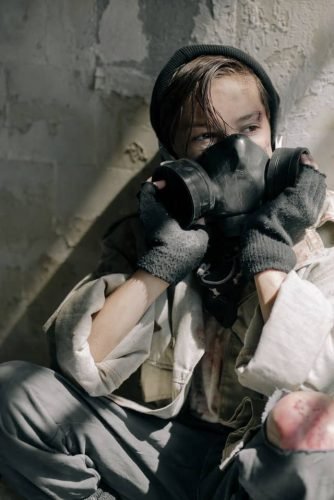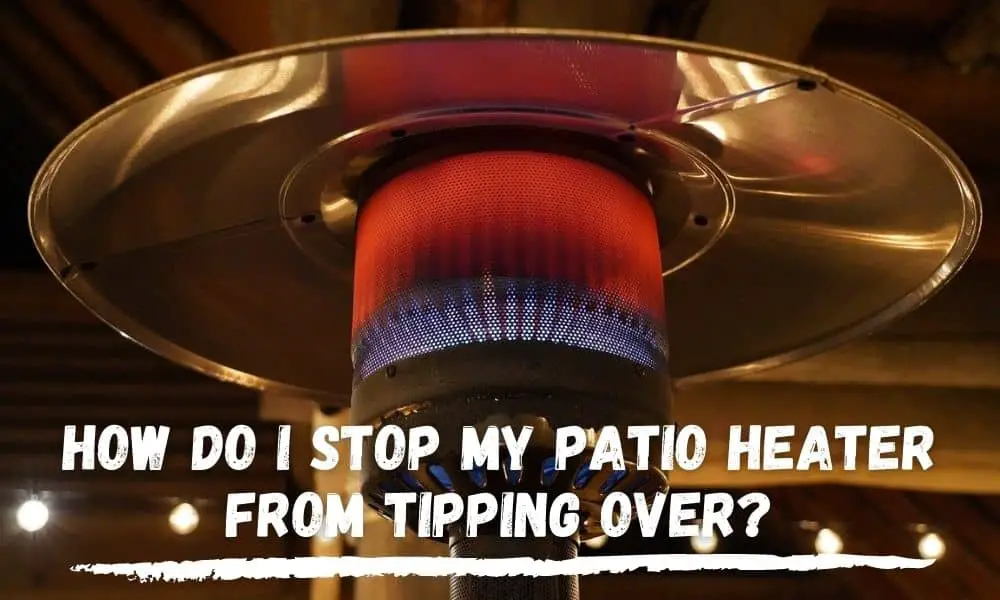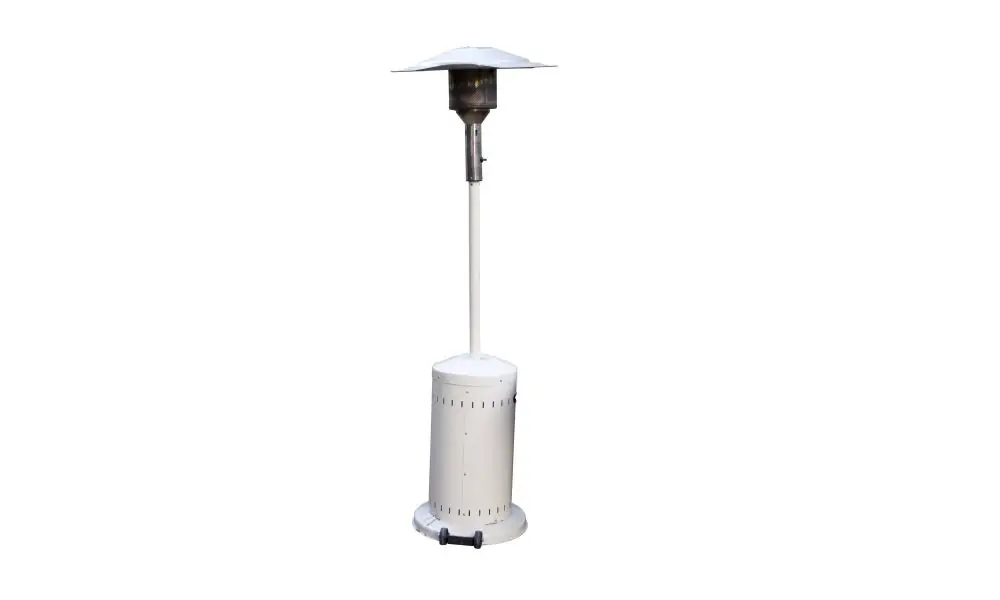Even if your fire pit is putting off adequate heat, you won’t enjoy the ambiance if it emits a terrible smell. Also, can you roast and eat marshmallows and hot dogs when your propane fire pit is giving off a bad smell?

Although they shouldn’t, sometimes propane units smell bad. Do you want to know how to combat the terrible smell? We’ll give you advice on that and answer other FAQs concerning these fire pits.
Quick Navigation
Which Is Better Propane or Wood Fire Pit?
The question of whether to go for a propane or wood fire pit is common.
Your decision depends on many factors, i.e., how much you are willing to spend on purchasing a fire pit, what level of commitment do you have towards fire pit maintenance practices, how much can you spare for fuel refilling plus repair and upgrades, and what kind of outdoor experience are you looking for in a fire pit.
Once you know the answers to these questions, you’ll be able to make an informed decision. Here is some information on propane and wood fire pits’ benefits and downsides to help you with your decision.
Merits of Wood Fire Pits
- Wood-burning pits typically require less money for materials acquisition than propane fire pits
- These units take less time to install than propane units
- Wood-burning units cost less to install than propane fire pits
- The brilliant visible flame from wood-burning units is a spectacular site
- It’s easy to determine when fuel is over in a wood-burning pit
- Thanks to their vast amounts of smoke and pungent smells, wood-burning units keep bugs away
- Wood-burning units produce better tasting food than propane gas fire pits
- These units allow food smoking, unlike a gas firepit
- Wood-burning units offer more heat than propane fire pits hence better ambiance
- Are more flexible in terms of the location to place them compared to a gas firepit
Demerits of Wood Fire Pits
- Wood-burning units are tedious to start a flame
- They produce more smoke and poisonous carbon monoxide compared to other fire pits
- Wood-burning units are tedious to clean
- These units are more prone to accidental fire outbreaks
- Wood-burning units require continuous firewood addition
- It takes a larger area to install a wood-burning fire pit than gas counterparts
- Wood-burning units require a place to store your firewood
- They are difficult and tedious to control the heat output
Merits of Propane Fire Pit
- Easier to get a fire going than a wood fire pit
- Produce fewer pollutants thus more environmentally-friendly
- Don’t leave behind ashes, hence have minimal cleaning practices
- Don’t produce embers; hence fewer chances of a fire hazard
- Are more compact than wood-burning outdoor fire pits
- Don’t require more space for logs
- Temperature control with less fire maintenance practices
Demerits of Propane Firepits
- Generally cost more to purchase and install than wood-burning models
- If a gas line rupture, the resultant fire will be hard to control
- Require large propane tanks and are costly to refill
- Take longer to install
- Limited food preparation options, i.e., no smoking
- Require you to purchase bug repellants
- The hardly-visible pale blue flame doesn’t give a realistic feel of a fire
- Produce carbon monoxide although in lesser amounts than wood-burning models
The content above is enough to help you choose which among the two offers more convenience. If you want to cook and get extra warmth, go for wood-burning models. Propane models are ideal for those who want minimal maintenance practices.
Are Propane Fire Pits Bad for the Environment?
You may question whether using your outdoor fire pit usage is good for the environment. These outdoor fire pits have some detrimental effects on the environment. Besides, if you misuse them, they are more dangerous to you than to the surroundings.
These units rely on fuel combustion as their heat source, similar to wood-burning, LPG, and natural gas fire pits. Upon burning, they result in carbon monoxide production. This gas is lethal to living organisms.
If you use a wood-burning, LPG, propane, or natural gas fire pit in a poorly-ventilated covered patio or gazebo, you’ll get poisoned.
Carbon monoxide poisoning causes many detrimental results. It leads to migraines, seizures, coma, temporary memory loss, death, among others. The worst part is that you won’t know you are inhaling poison as this gas is odorless and tasteless.
So, make sure you use your gas fire pit in spaces with a good oxygen supply like your backyard.
Why Do I Smell Propane From My Fire Pit?

There are various answers to this question. Let’s look at the multiple reasons for odors in your unit.
Propane Leaks
A terrible smell might be a sign of a gas leak in your outdoor fire pit. Some say it smells like rotten eggs. Others describe the smell as sewage-like pungent.
No matter the term you use, we all agree that propane gas has an unpleasant odor. However, if you have a properly installed unit, you shouldn’t detect this smell.
One of the few clean-burning fuel sources is propane. That means that it shouldn’t leave behind many contaminants upon combustion.
If your propane gas fire pit smells, some propane might be escaping without burning. This is mostly due to a leak. If the gas comes to contact with your outdoor fire pit’s flame, the resultant fire is uncontrollable.
Sometimes, however, you may get an occasional puff of this foul smell. That shouldn’t worry you much because it helps to keep the burning process going.
However, if the smell persists, quickly turn off your heater and get a certified gas professional. Some experts recommend avoidances of landline and electricity usage within your home if you have a gas unit. These may form sparks that will ignite the leaked gas.
Observe caution. Although gas explosions are rare, you may be next if you’re careless.
Setup Smells
What materials are in your outdoor fire pit? The type of products in your backyard unit might be the issue. These items affect burning.
When using paints and fake wood in your fire pit, you’ll conduct extensive burning. This ensures these products receive ample heat for proper curing. It should take at least three hours.
During your first usage times, you may still get the smell. However, it eventually disappears.
Material Type
The kind of material you line your unit’s bottom with may account for the bad smell. Opt for materials that are highly heat-resistant and don’t crumble or discolor under high heat. Examples include;
- Glass
- Lava rock
- River rock
- Silica sand
When you use river or lava rock, they may emit smells once you light your pit. Silica sand’s smell varies with its purity level.
If the smells from these materials affect you, consider glass.
Burnt Smell
A smoky or burnt smell is a sign that your outdoor fire pit is dirty. Over time debris(and sometimes soot)settles on and around your outdoor fire pit. When you turn it on, these materials burn to result in a smoky smell.
When you get this smell, you should;
- Dust your pit
- Let your pit cool completely
- Use a rag to wipe all surfaces containing dust
- Be keener while wiping valves and vent ducts
- Replace vents and grates you removed while dusting
Dusting may seem like something you don’t have to rush to do. However, these materials create heat that may spoil your pit’s parts, prompting repair.
Other Factors
If all the above aren’t the issue, try this last option. Almost anything produces a smell once heated. Therefore, check the materials around your backyard unit.
Remove everything and reintroduce them progressively. You should identify the cause of this smell.
How Long Does Propane Last for a Fire Pit?
The kind of fire pit and your temperature settings determine how long you‘ll use your propane tank.
A 20-pound tank lasts 3-6 hours on average. Sometimes, this amount lasts up to 9 hours or 1 ½ hours depending on your BTU rating.
A 20-pound propane tank has a 430 000 BTU capacity. To determine the length of time, divide this number with your pit’s BTU rating.
Besides your temperature settings, the weather also determines your fuel depletion rate. For instance, on windy and chilly days, you’ll have to set your fire pit at high output.
Is it Safe to Use a Propane Fire Pit Indoors?
This question is one of the most common questions people ask concerning indoor heating. Whether you can or can’t use a propane fire pit or other gas heating method indoors depends on ventilation.
This fire pit, since it involves fuel combustion, leads to carbon monoxide production. As we discussed earlier, there are numerous harmful side effects of carbon monoxide poisoning.
If you have a poorly ventilated home(mostly old houses), you shouldn’t try fuel combustion warming methods indoors.
Don’t assume that leaving some windows open while using it is okay. An uninformed family member or friend may turn it on while you’re away without considering ventilation.
So, if your house has excellent ventilation, it’s okay. With low ventilation features, seek electric fireplaces and heaters for indoor warming.
A breach in your gas line connection leads to leakage. A slight spark is enough to create an explosion. Remember, a propane fire pit features an open flame. Besides this gas, there are numerous flammable materials, including your dishwashing soap.
Therefore, the incidences of fire are higher than when using an electric fireplace or heater. A fire in your stand-alone gazebo won’t destroy too much property. Imagine a fire razing down your entire house!
These are some of the reasons why numerous people prefer an electric fireplace or heater for indoor warming.
Are Propane Fire Pits Worth It?
As mentioned earlier, this fire pit has numerous benefits. Besides, they have an average heat output ranging between 40, 000- 100, 000 BTUs. Thus, they have ample warmth for small and averagely-sized gatherings.
Make sure you observe fire pit maintenance practices like covering it after usage. Remember to inspect the causes of soot and black smoke in your fire pit. When you properly maintain your fire pit, you’ll lengthen its life span and get the most out of it.
The short answer to this question is, they are a worthwhile investment, but they require a lot of proper care.
Conclusion
So, back to our main question: do propane fire pits smell bad?
With proper installation, these fire pits don’t have a terrible smell. However, if you smell propane, ensure you immediately shut your fire pit.
Use the information in your manual to troubleshoot the problem. If the problem persists, call a certified professional to look into it.
Remember that smells may also be present during the first times of using your fire pit. These shouldn’t worry you much as they are probably things like chemical additives and paints.
The way you maintain your unit also determines the presence of terrible smells. Make sure to cover your fire pit when not using it. You’ll minimize dirt build-up and insect infestation in your pit.
Finally, clean your pit and the area around it from time to time to enjoy the most from it.




